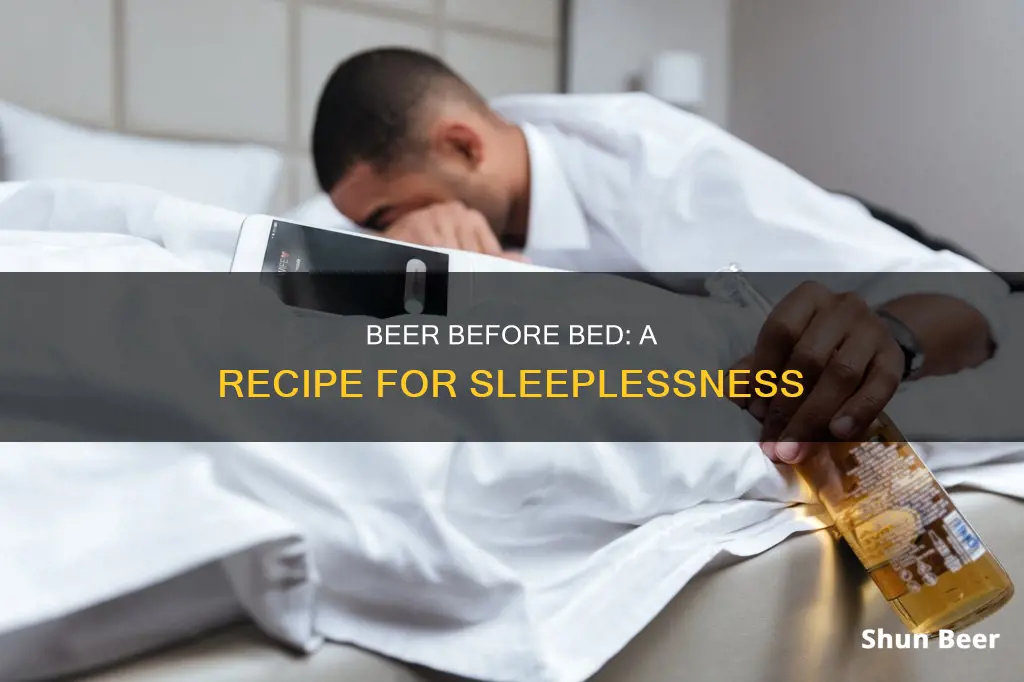
Alcohol has a strange relationship with sleep. While it acts as a depressant and can make you feel drowsy, it doesn't help you achieve proper sleep. In fact, it can be the reason you can't sleep after drinking beer.
Alcohol disrupts your sleep architecture, the normal phases of deeper and lighter sleep you go through every night. A night of drinking can interrupt these patterns, and you may wake up several times as you go through the usual stages of sleep.
Alcohol also affects the latter half of your sleep cycle, where you experience the most sleep issues. It inhibits REM sleep, the stage associated with dreaming and deep sleep. As your liver metabolizes the alcohol, it reverses the initial sedative effects and starts pulling you out of your REM cycle. So, instead of deep restorative sleep, you get light sleep.
Additionally, alcohol is a diuretic, which means you may find yourself waking up in the middle of the night to go to the bathroom. It also affects the body, not just the brain. It relaxes the muscles, which can lead to constricted breathing and obstructive sleep apnea, causing lapses in oxygen to the brain.
So, if you're wondering why you can't sleep after drinking beer, it's because alcohol disrupts your sleep cycle and affects your overall sleep quality.
| Characteristics | Values |
|---|---|
| Sleep disruption | Dehydration, frequent trips to the bathroom, sleep apnea, REM sleep disruption, increased NREM sleep, decreased sleep quality, hangover, sleep disorders, circadian rhythm disruption |
| Sleep quality | Decreased by 9.3% with one serving, and up to 39.2% with more than two servings |
| Sleep duration | Longer time to fall asleep, frequent wakings, overall low-quality sleep |
| Sleep architecture | Disruption of normal sleep phases, including NREM and REM cycles |
| Sleep disorders | Insomnia, sleep apnea, snoring, circadian rhythm disruptions |
| Sleep aids | Alcohol is not a recommended sleep aid, it can create a vicious cycle with caffeine |
| Sleep recommendations | Avoid alcohol close to bedtime, drink plenty of water, eat a balanced meal, don't mix alcohol with sleeping pills |
What You'll Learn

Dehydration and Dry Mouth
Alcohol is a diuretic, which means it causes your body to flush fluids through your renal system, including your kidneys and bladder. This can lead to dehydration, which is why many people wake up in the middle of the night to drink water after consuming alcohol. Dehydration can cause a raging headache, dizziness, and an overall feeling of wretchedness the next day. This is especially true for older adults, as their bodies are not able to flush out toxins as quickly.
Drinking alcohol can also cause dry mouth, or xerostomia, which is a condition caused by a decrease in salivary flow rate. According to a study in the Japanese Dental Science Review, heavy drinking can change your salivary flow rate, and many studies have demonstrated a decrease in salivary secretion in heavy drinkers. Dry mouth can impact your overall health, as the enzymes in saliva aid in digestion. It can also cause oral health issues, such as difficulty chewing and swallowing, an increase in plaque buildup, tooth decay, and gum disease.
To combat dehydration and dry mouth after drinking alcohol, it is recommended to drink plenty of water, both during and after drinking. It is also suggested to eat something while drinking, as this will help to slow down the absorption of alcohol into the bloodstream.
Spinal Tap Procedure: Beer Drinking and Recovery Time
You may want to see also

Frequent Trips to the Bathroom
Alcohol is a diuretic, which means it increases urine output. So, if you drink alcohol before bed, you may find yourself needing to get up in the middle of the night to go to the bathroom. This can make it difficult to get back to sleep and disrupt your sleeping rhythm.
Dr Bhanu Prakash Kolla, an associate professor of psychiatry and a consultant at the Center for Sleep Medicine at the Mayo Clinic in Rochester, Minnesota, says that "moderate amounts of alcohol, especially wine and spirits, have an early diuretic effect, especially in the elderly".
It's not clear whether the urge to urinate is what wakes you up, or if you're more in tune with your body in the second half of the night because you're sleeping more fitfully. However, getting up to go to the bathroom in the night can disrupt your sleep, and it takes time for your body to adjust back into its sleeping rhythm.
If you're drinking alcohol, it's recommended that you have your last drink at least a few hours before bedtime. The Sleep Health Foundation recommends stopping alcohol consumption about four hours before going to bed. This will give your body time to process the alcohol and reduce the likelihood of needing to get up in the night.
Beer and Ketosis: What You Need to Know
You may want to see also

Aggravated Sleep Apnea
Alcohol can aggravate sleep apnea symptoms by increasing snoring, reducing sleep quality, and lowering oxygen levels in the blood, leading to more frequent sleep apnea episodes.
Alcohol can cause muscle relaxation, leading to airway obstructions during sleep. This is particularly true of the muscles in the throat, which can relax too much and cause constricted breathing. This leads to a condition known as obstructive sleep apnea, which causes lapses in oxygen to the brain. According to the Sleep Health Foundation, alcohol can increase the risk of sleep apnea by 25%.
Alcohol also causes changes to blood vessels in the nose, leading to greater airway resistance in the nasal passages. These alterations significantly increase the likelihood and duration of breathing events during sleep.
Additionally, alcohol can cause nasal congestion, making obstructive sleep apnea more likely. One factor that people don't often associate with alcohol and sleep apnea is nasal congestion. Certain alcoholic beverages can cause your sinuses to begin producing extra mucus. These drinks also tend to cause dehydration, which leads to swelling in the sinuses.
If you have sleep apnea, it is recommended that you limit or avoid alcohol consumption. If you choose to drink, it is important to maintain your sleep apnea treatment routine.
Nursing and Alcohol: Is One Beer Safe?
You may want to see also

Disrupted Sleep Architecture
Alcohol is a nervous system depressant that slows down brain activity. While it can initially put you to sleep, the second half of the sleep cycle is where you experience the most sleep issues. Even one drink can decrease sleep quality by 9.3%. High amounts of alcohol will lead to even less sleep and decrease sleep quality by nearly 40%.
Decreased Rapid Eye Movement (REM) Sleep
There are primarily two stages of sleep in a normal sleep cycle. The NREM (Non-rapid eye movement) stage and the REM (rapid eye movement) stage. Alcohol affects the latter stage.
Alcohol intake before bed is associated with more slow-wave sleep patterns, a portion of NREM sleep characterised by lower brain activity.
Alcohol inhibits REM sleep, the stage in your sleep cycle associated with dreaming and deep sleep. As your liver metabolises the alcohol in your body, alcohol leaves your system. It reverses the initial sedative effects and starts pulling you out of your REM cycle. So at best, you're just getting some light sleep as opposed to deep restorative sleep. Depending on the amount of alcohol consumed, a reduction in REM sleep will affect overall sleep quality and you'll wake feeling the effects.
On top of that, heavy alcohol intake and binge drinking can change your melatonin (the sleep-regulating hormone) levels for up to a week after alcohol use.
There is also a solid connection between heavy drinking and sleep disorders, like insomnia. About 30% of people who suffer from chronic insomnia have reported that they self-medicate with alcohol to help them sleep.
Aggravated Sleep Apnea
Alcohol also affects the body, not just the brain. It increases blood flow to the skin, creating the illusion of warmth. In reality, heat is evaporating through the skin faster than usual, causing body temperatures to fall.
Alcohol also relaxes the muscles, which can lead to major problems before bed. Constricted breathing can occur if the muscles in the throat relax too much. This leads to a condition known as obstructive sleep apnea, which causes lapses in oxygen to the brain.
According to the Sleep Health Foundation, alcohol can increase the risk of sleep apnea by 25%. So if you already have sleep apnea, it's not a good idea to exacerbate it by drinking before bed.
Beer Drinking Champions: Who Consumes the Most?
You may want to see also

Circadian Rhythm Disruptions
Circadian rhythms are prominent in many physiological and behavioural functions. Alcohol use and dependence appear to interfere with circadian rhythms, which are biological patterns that operate on a 24-hour clock. Alcohol's effects on sleep can be both acute and chronic, affecting heavy drinkers in the long term.
Alcohol is a nervous system depressant, meaning it slows down brain activity. While you may experience a boost of energy and elation after the first couple of glasses, those effects won't last all night. In fact, you're pretty likely to wake up feeling lousy.
Alcohol affects the gamma-aminobutyric acid, or GABA, a neurotransmitter that slows impulses between nerve cells, which can make you feel relaxed at first. But while it can initially put you to sleep, the second half of the sleep cycle is where you experience the most sleep issues. Even one drink can decrease sleep quality by 9.3%. High amounts of alcohol will lead to even less sleep and decrease sleep quality by nearly 40%.
Alcohol intake before bed is associated with more slow-wave sleep patterns, a portion of NREM sleep characterised by lower brain activity. But alcohol inhibits REM sleep, the stage in your sleep cycle associated with dreaming and deep sleep. As your liver metabolises the alcohol in your body, alcohol leaves your system. It reverses the initial sedative effects and starts pulling you out of your REM cycle. So at best, you're just getting some light sleep as opposed to deep restorative sleep. Depending on the amount of alcohol consumed, a reduction in REM sleep will affect overall sleep quality and you'll wake feeling the effects.
Heavy alcohol intake and binge drinking can change your melatonin (the sleep-regulating hormone) levels for up to a week after alcohol use. There is also a solid connection between heavy drinking and sleep disorders, like insomnia. About 30% of people who suffer from chronic insomnia have reported that they self-medicate with alcohol to help them sleep.
Alcohol also affects the body, not just the brain. It increases blood flow to the skin, creating the illusion of warmth. In reality, heat is evaporating through the skin faster than usual, causing body temperatures to fall.
Alcohol also relaxes the muscles, which sounds nice in theory, but can lead to major problems before bed. Constricted breathing can occur if the muscles in the throat relax too much. This leads to a condition known as obstructive sleep apnea, which causes lapses in oxygen to the brain. According to the Sleep Health Foundation, alcohol can increase the risk of sleep apnea by 25%. So if you already have sleep apnea, it's not a good idea to exacerbate it by drinking before bed.
Alcohol is a diuretic, meaning it causes your body to flush fluids through your renal system, which includes your kidneys and bladder. So, if you are not taking in enough water while you knock back a few drinks, your body will be losing fluids faster than you can replace them. The effects of dehydration can leave you with a raging headache, make you feel dizzy, and lead to all-around wretchedness when you wake. This is even more prevalent in older adults. As we age, our metabolism slows down and our body is not able to flush out the toxins as quickly. Just think about the hangover in your 20s versus the pitiful affair that is the hangover in your 30s.
Human genetic studies have found mutations in a few of the circadian genes that are associated with alcohol addiction. Evidence from circadian mutant mice have begun to uncover the role of these genes in alcohol-related behaviours. For example, the circadian gene, Clock, is expressed in the ventral tegmental area (VTA) and nucleus accumbens (NAc) and has been implicated in modulating reward processing, providing a candidate target for ameliorating critical risk factors in models of addiction and bipolar disorder.
Beer and Amoxicillin: Is It Safe to Drink?
You may want to see also
Frequently asked questions
Alcohol disrupts your sleep cycle, forcing you into a deep sleep and missing the beginning stages of sleep. This causes you to wake up multiple times during the night.
It is recommended to wait at least 3 hours before going to sleep after drinking beer. It takes around 1 hour for your body to process 1 serving of alcohol.
Drinking beer before bed can lead to frequent wakings and overall low-quality sleep. It can also cause headaches, night sweats, snoring, and nightmares.







